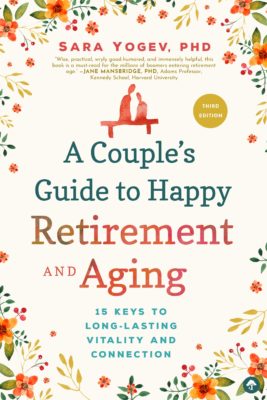Nov 17 2019
The Impact of Retirement on Couple’s Relationships (Guest Blog post at Marianne Oehser’s retireandbehappy.com/blog)
In contrast to the extensive time people usually devote to financial planning for retirement, they often neglect to plan for the psychological aspect of this life stage. Marianne Oehser calls it your Happiness Portfolio®.
Related to that is the complete lack of awareness of the impact retirement has on the couple’s dynamics, which can be compared to the impact of the birth of the first child on the couple’s dynamics. Only at the earlier life stage couples are usually more prepare – aware of the changes and willing to discuss them.
Indeed, both genders report in the first two years post-retirement low marital satisfaction and a higher level of conflict. The Gray Divorce phenomena – divorce among the 50+ years old — might be related to retirement. It is growing at an alarming pace while overall divorce rates are getting lower. A June 21 2019 article in the Wall Street Journal reported that the rates of gray divorce more than doubled; for the 55-64 years old, it climbed from 5 divorces per 1000 to 15 divorces per 1000 and for those 65 and older it rose from 1.8 to 5. Furthermore, the expectation is that there will be 800,000 divorced individuals in 2030 that are 50+. These statistics might be related to the lack of preparation or awareness of the difficulties retirement poses on the marital dynamics.
In all marriages, even stable and long-term ones, couples need to be ready and willing to renegotiate a lot of issues when one or both partners retire. Time together and apart, division of housework, relationship with adult children and grandchildren are only a few examples.
Emotional intimacy with a significant other is the most important relationship for older adults – it reduces loneliness and social isolation and it enhances longevity.
Loneliness has strong negative health influences. The quality of a couple’s relationship is most important for seniors because in the third age strong and satisfying emotional bonds between spouses are closely related to life satisfaction as well as health. A high degree of agreement between spouses in several aspects of daily life, overall life goals, good conversations and the identification of the spouse as confidant are significantly associated with lower levels of loneliness and overall higher levels of life satisfaction. Therefore, it is very important for retirement age individuals to have good marriages or relationships with their significant other.
In retirement, there is increased time together, and it can weaken even the strongest ties as it brings tension and friction to the surface. For example, annoying habits of the partner are more glaring – his “addiction to news” watching news on multiple channels, or her repeating the same story to different friends she talks on the phone. In addition, unresolved issues of the past must be addressed as there is no distraction from them.
Communication is very important. Thus couples ought to be ready to discuss their expectations and preferences, to be prepared for disagreements and be willing to address them so that issues can be resolved. There are no right or wrong preferences here. There is only a need to align and adjust expectations- having differences doesn’t mean it is a bad relationship. Getting aligned will get the relationship to a stronger more satisfying place.




